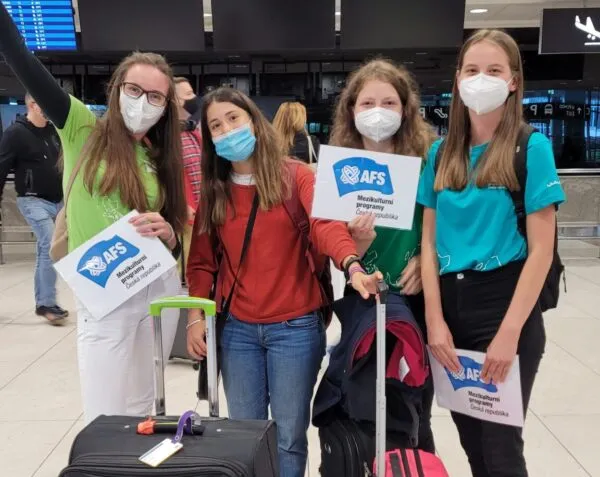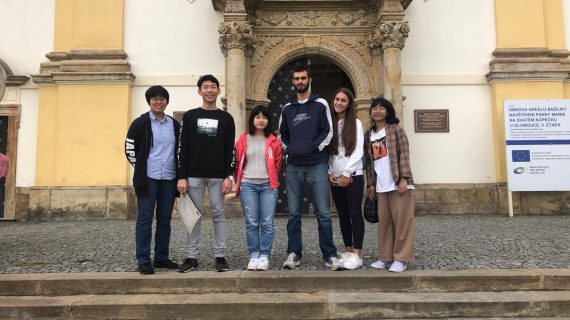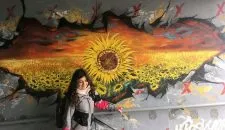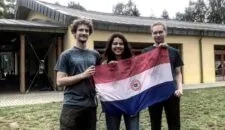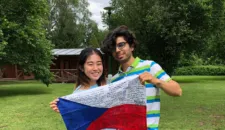Primary school starts at the age of 6 and lasts 9 years. Secondary school lasts 4 years and it usually includes: General secondary schools (gymnázium), which are usually highly competitive and selective high schools specialized in teaching modern languages, natural sciences or specialized in physical training disciplines. This type of school usually leads to a higher level of education. Vocational schools (business, nursing, industrial, music, and art academies) Apprentice schools, attached to industries and services, related to the more practical side of life. Most Czech schools are public schools, though since 1990 new private schools have been established, especially on the secondary level, and their numbers have been steadily growing. There are 400-500 students in a school and 20-30 students per class. Students do not wear uniforms.
The usual school day starts at 8 am and ends around 2 or 3 pm. Typically, there are about 3 lessons of the Czech language, 3 lessons of German/French/Spanish, 3 lessons of English, 2 lessons of History, 2 lessons of Geography, 2 lessons of Physics, 4 lessons of Math, 3 lessons of Biology and 2 lessons of PE. The schedule is the same for every week. Students’ knowledge is tested by oral and written exams, which are classified on a scale of 1 to 5. The students can receive also a written evaluation, which replaces or supplements the marks.
- 1 = Outstanding
- 2 = Very good
- 3 = Good
- 4 = Poor
- 5 = Failing
Parents are informed about their children’s study results through the “Pupil’s Record Book”, which is mostly online, and at regular (trimester) meetings when they are also forewarned about possible failures or more serious disciplinary problems. At the end of the semester and at the end of the school year students receive report cards/certificates.
The AFS CZE Academic Program is designed to provide students with a wonderful opportunity to live with a Czech host family, be part of a Czech community and attend a Czech high school. Along with this opportunity comes responsibility. You should understand that this is an academic program and even if you have “already graduated” or are not depending on credits from this year to count towards your graduation in your home country, you have to attend the school lessons regularly and make an effort to perform well.
Schools also expect that the students they agree to host are coming on this program to study and to become full members of their high school community. Most schools are hoping that the Czech students in the high school will learn as much as you through their interaction on a daily basis in classes, in school clubs, and in activities.
You are expected to attend school on a regular basis, complete all work assigned both in and outside class, and show continuous effort throughout the year, working to your fullest potential. Be aware that you are representative of your country and AFS and your behavior will be judged by the school community as a representative of other AFS students and people from your country.
The AFS students are mostly placed in high schools of very good academic standing (gymnázium). Where appropriate, students can be also placed in other types of secondary schools, for example, business schools, that are similar to the previous academic institution of the student. The schools may be either state or private. Most of the students are placed at state schools, which is the most common way for Czech students too.
School attendance is compulsory. If absent the student must inform the teacher within a day (usually a written letter explaining the absence from the parents). Schools adjust the weekly schedule for you so that you don’t have to attend subjects that require advanced knowledge of Czech, but you may attend different courses with other classes. This situation can change when your language skills are better and you will be able to follow also the classes that would be too difficult for you during the first months.
AFS Students are usually not graded but verbally evaluated. They do not receive the same certificate as the Czech students. However, they can receive a certificate of school attendance. The first few months will be probably difficult whilst you are learning Czech but you will no doubt find that school is a perfect environment for learning about our culture and our people. It is there where you make most of your friends.
School expenses
Things that will be arranged at no extra cost to you are:
- School fees if necessary (only at private schools)
- School textbooks
- Transportation to and from school – the train, tram, or public bus
The AFS student must pay for:
- School supplies (such as pencils, copy-books, …)
- School trips – schools usually organize a one-week mountain trip during winter and sometimes day trips during the summer. These trips are not compulsory. However, it provides a great opportunity to meet with the students and teachers informally.
Not all schools offer activities. They may have some special interest clubs (computer, drama, sports); however, AFS students as well as Czech students mostly join sports clubs or pursue other types of out-of-school activities (e.g. dance classes, pottery, choir) organized by various youth organizations. Most Czech students have one or two extra-curricular activities they attend regularly once or twice a week. Some of these classes must be paid for. School and these courses are the most common places where teenagers develop friendships with each other.
The teachers are always treated with respect, there is quite a social distance between teacher and student, the teacher is perceived as an authority. The school has a strict order which is necessary to follow. If not, you can be expelled. The lessons are mainly theoretical, not very interactive or practical.
Czech students always use part of the afternoon for doing homework or studying for the exams. The exams are done throughout the whole school year, depending on the teacher’s decision.
Czech students are not very open at first: some of them are shy about speaking English, and some of them have just a small group of schoolmates they are friends with. Try to approach them actively, invite them to go out with you, show them your interests and you will find friends that will be interested in joining you, plus you will discover how friendly, enthusiastic, and fun-loving the Czechs are.
